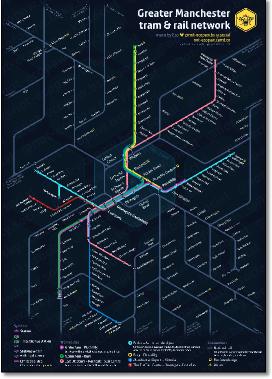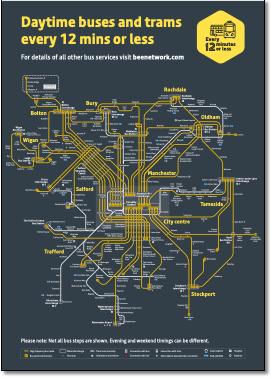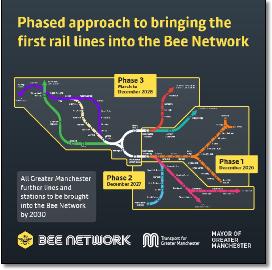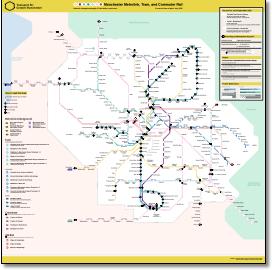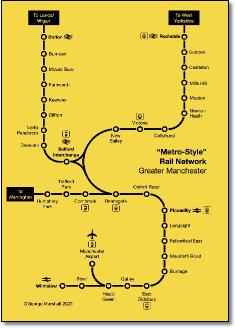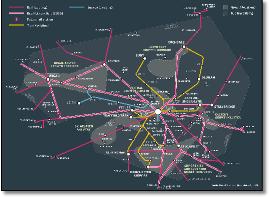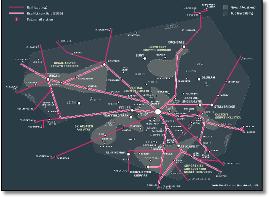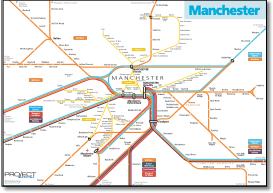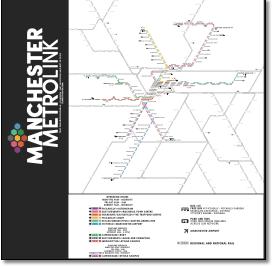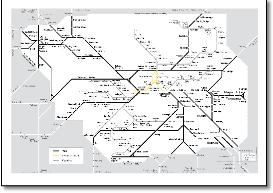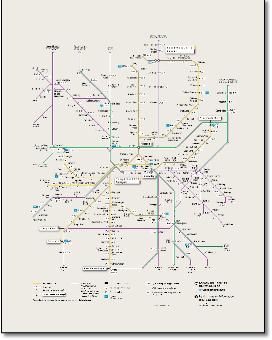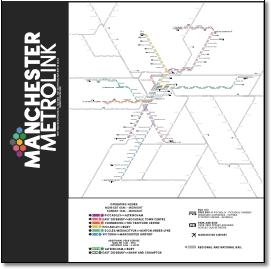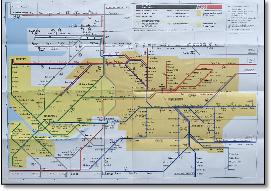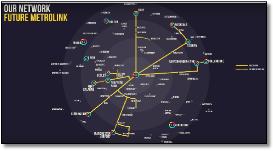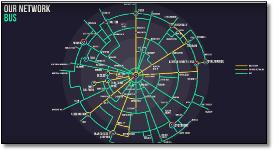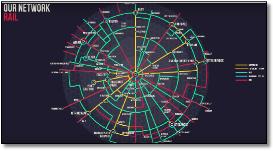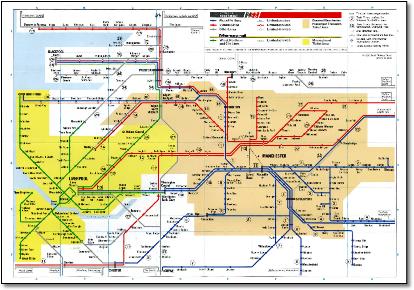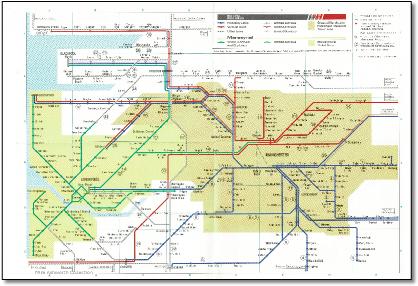|
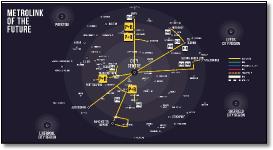 |
|
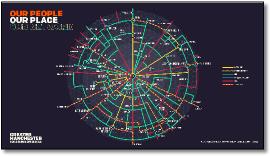 |
|
|
|
 |
|
|
|
|
|
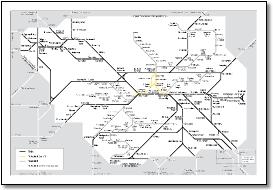 |
|
|
|
|
|
|
|
 |
|
|
|
 |
 |
|
|
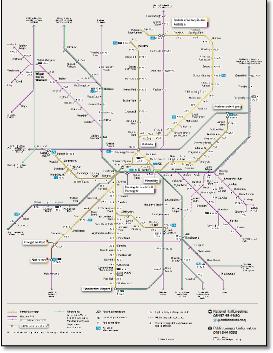 |
|
|
 |
|
 |
 |
|
|
|
 |
|
 |
|
|
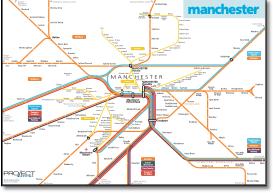 |
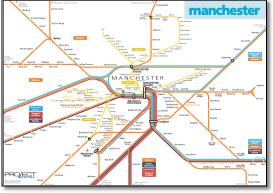 |
|
|
|
|
 |
|
|
|
 |
|
 |
|
|
|
|
 |
|
|
|
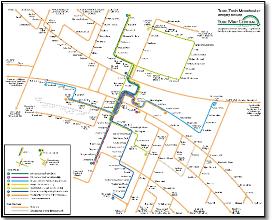 |
|
 |
 |
|
|
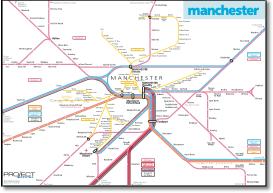 |
|
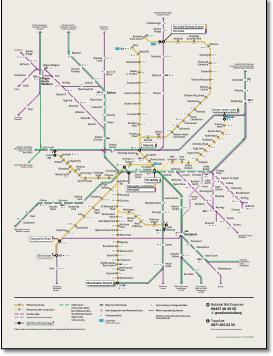 |
|
|
|
|
 |
|
|
 |
The Master is developing his ideas beyond his circle series. Interesting. But impractical?
|
 |
|
|
|
|
 |
|
|
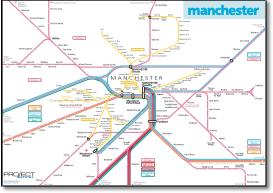 |
|
|
|
|
 |
|
|
|
|
|
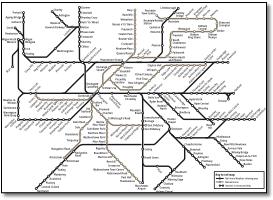 |
|
|
|
|
|
 |
|
|
|
 |
 |
|
|
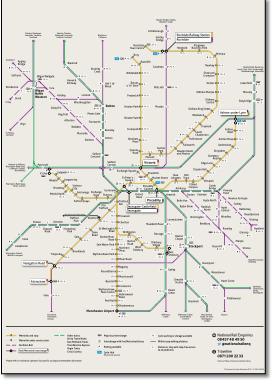 |
|
|
|
|
 |
|
|
 |
|
|
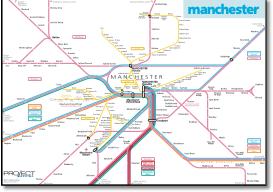 |
|
|
|
 |
|
|
|
|
|
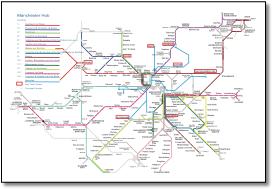 |
|
|
|
|
|
 |
|
|
 |
|
|
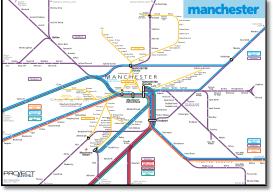 |
|
|
|
|
 |
|
|
|
|
|
|
|
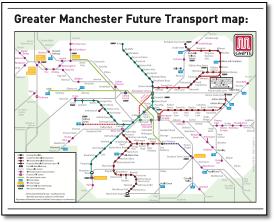 |
|
|
|
 |
|
|
|
|
|
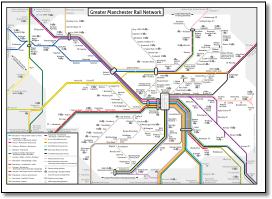 |
|
|
|
|
|
Now with second city crossing shown open.
|
|
|
|
|
|
 |
|
|
 |
|
|
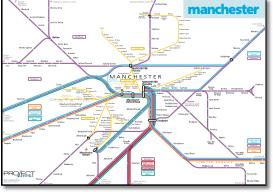 |
|
|
|
|
This map features in the centre spread of the multipage A4 public consultation document issued to all homes in the GMPTE area in summer of 2008. Based on the existing rail map, proposed bus and metrolink routes are superimposed without consideration of the overall appearance.
Considering GMPTE want the public to support congestion charging (to support the £3b public transport TIF initiative), this is a pretty poor way of campaigning for support.
|
|
|
|
|
|
 |
|
|
|
|
|
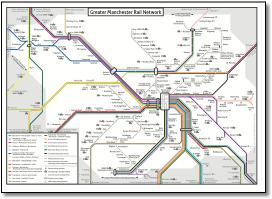 |
|
|
|
|
|
Now with Trafford Centre extension.
|
|
|
|
|
|
 |
|
|
|
|
 |
|
|
|
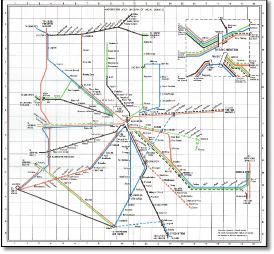 |
|
|
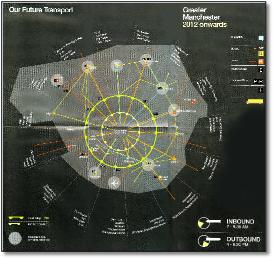 |
|
|
|
|
|
 |
|
|
|
|
|
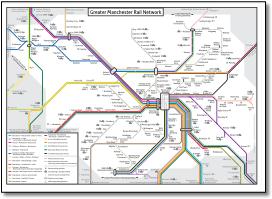 |
|
|
|
|
|
 |
|
|
|
|
|
This map features in a leaflet distributed earlier in 2008. A great bit of graphic design, with a lot of energy input by someone with clear graphic design skills - but is its meaning clear?
Apologise for bad scan and retouching.
|
|
|
 |
|
|
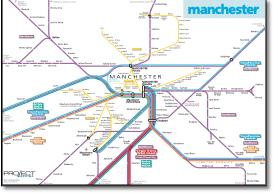 |
|
|
|
|
 |
|
|
|
|
|
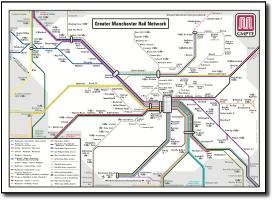 |
|
|
|
|
|
 |
|
|
|
 |
|
|
|
|
|
 |
 |
|
|
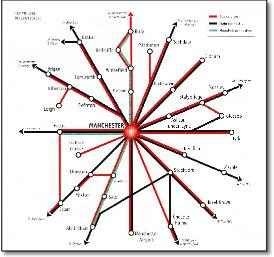 |
|
|
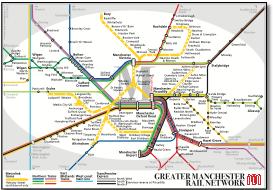 |
|
|
|
Horrible at Styal.
|
|
|
|
|
|
 |
|
|
|
|
|
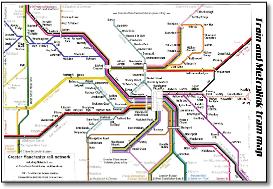 |
|
|
It may not be possible to update this map to include the Metrolink extension to the Airport, the second city crossing or to the Trafford Centre.
|
|
|
|
 |
Perhaps this is where the map above came from?
|
 |
|
|
|
|
|
|
|
 |
|
|
|
|
|
|
|
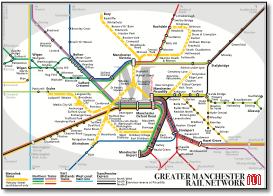 |
|
|
|
 |
|
|
|
|
|
A compact version of those below for A6 booklet with superfluous detail removed. Adds kinks to the WCML and at Salford Crescent, presumably to accomodate larger station names around Bolton.
|
|
|
|
|
|
 |
|
|
|
|
|
 |
|
|
|
This banner seems to use different symbolism - different line weights and station symbols to its main maps. Very subtle difference in the symbol used to describe a bus, a tram and a train.
|
|
|
|
|
|
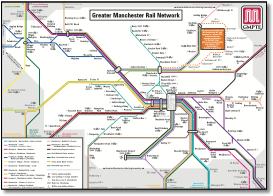 |
|
|
|
 |
|
|
|
|
|
|
|
 |
|
|
|
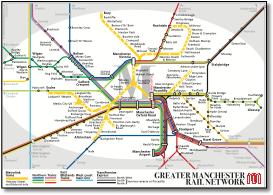 |
|
|
|
|
|
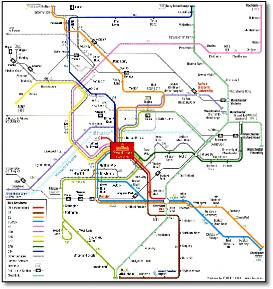 |
|
|
|
|
|
 |
|
|
|
|
|
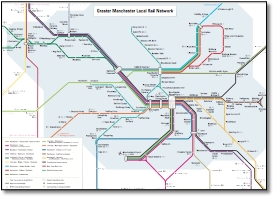 |
|
|
|
|
|
 |
|
|
|
|
|
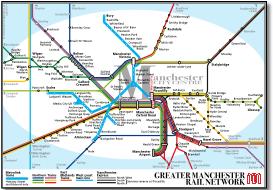 |
|
|
|
|
|
 |
|
|
|
|
|
Launched in a blaze of publicity in November 2007 as a 'London tube style' map
Many faults were identified and featured in Rail Magazine 'letters to the editor' to which GMPTE replied with the usual platitudes. These were as follows and have largely been subsequently corrected, without acknowledgement, as identified below.
1 Doesn't show the Central Trains Liverpool - Norwich service or the Stalybridge - Liverpool stopping service. Corrected
2 Shows the CLC stopping service running into Piccadilly - they all terminate at Oxford Road. Corrected
3 Shows TransPennine Express as one service when there are three distinct regular routes - creating an inconsistency in the interpretation and undermining the stated aim. These services provide additional travel opportunities avoiding a change of train.
4 Wrongly shows electric services from south Manchester stations running to Salford Crescent where there are no overhead wires. Corrected
5 Wrongly shows Warrington Bank Quay on the CLC route and Middlewood on the Hope Valley main line. Corrected
6 Unnecessary bends.
7 Unusual ghosting of routes inside station boxes (are you supposed to see them or not?).
8 Incorrect presentation where lines cross,
|
|
|
|
|
|
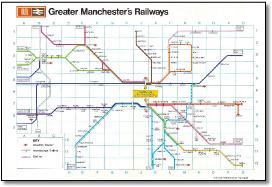 |
|
|
Added Metrolink south Manchester line.
|
 |
|
|
|
|
 |
|
|
|
|
|
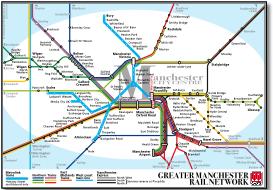 |
|
|
|
|
|
 |
|
|
|
|
|
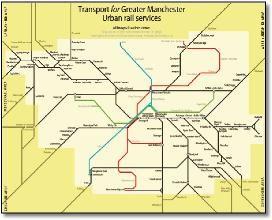 |
|
|
Added Media City UK and renamed Deansgate-Castlefield.
|
 |
|
|
|
|
 |
|
|
|
|
|
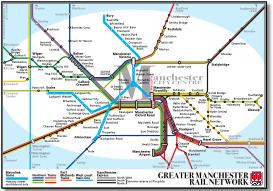 |
|
|
|
|
|
 |
|
|
|
|
|
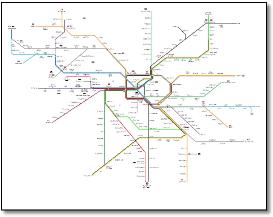 |
|
|
|
|
|
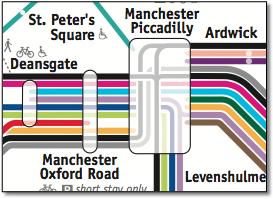 |
|
|
Oldham loop removed.
|
 |
|
|
|
|
|
|
 |
|
|
|
|
|
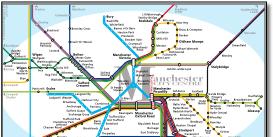 |
|
|
|
|
|
 |
|
|
|
for example shows Metrolink going under CLC with a distinct ‘bridge’ graphic whereas it goes over.
9 Inconsistent station spacing and application of the interchange station symbol, to name but a few.
10 16 colours (19 in 2008) is too many for people to make distinctions.
11 GMPTE area is shaded providing emphasis to the outer area. Corrected
Still doesn't say whether large stations with ghosted content are interchange or major. Whereas one is unlikely to change trains at Manchester Airport, one is at Stalybridge.
The 2008 version has added the Arriva Trains Wales to south Wales and WCML south of Piccadilly which add no additional direct services although it does identify additional operators. Is it worth making the key even more complex with 19 colours for that subtle benefit?
|
|
|
|
|
|
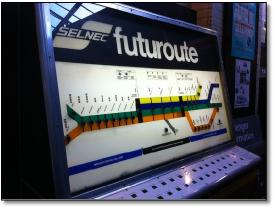 |
|
|
 |
 |
|
|
|
 |
|
|
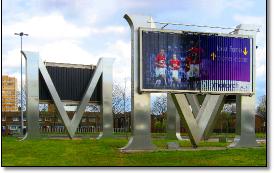 |
|
|
|
|
 |
|
|
|
|
|
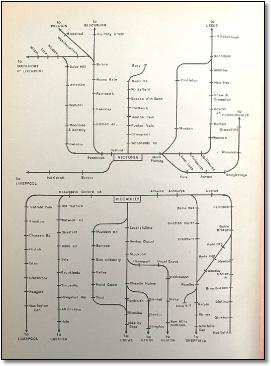 |
|
|
|
|
|
Project Mapping version
1 Manchester city centre is centrally placed on the map. Using the ‘M’, as seen entering Manchester on many roads, adds character and identity to the map.
2 Better use of space - more ‘even’ in appearance overall, typeface is larger and more readable.
3 GMPTE area is white and an oval instead of an irregular grey shape.
4 Shows Metrolink in a bolder line with slightly different station circles - makes it distinct.
5 Shows the distinct TransPennine services and Central Trains (London Midland).
6 Keeps the WCML straight.
7 Shows Piccadilly better with the distinction of the M&AJR platforms.
8 Is better related to users understanding of Manchesters geography.
9 Overall, map fits a smaller area.
But will have to consider multiple operators (for example ATW and Virgin as well as Northern south of Piccadilly).
|
|
|
|
|
|
 |
|
|
|
|
|
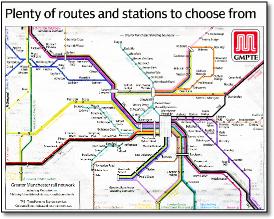 |
|
|
|
|
 |
|
|
|
|
|
A simplified version of above maps seen in Manchester Evening News December 2008.
|
|
|
|
|
|
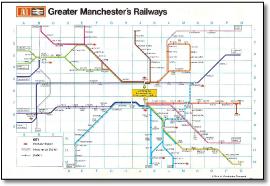 |
|
|
|
|
|
 |
|
|
|
|
 |
|
|
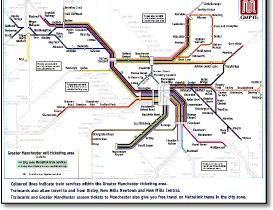 |
|
|
 |
|
|
|
|
|
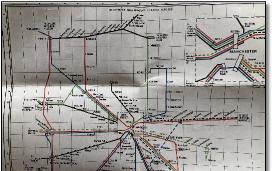 |
|
|
|
|
|
 |
|
|
 |
|
|
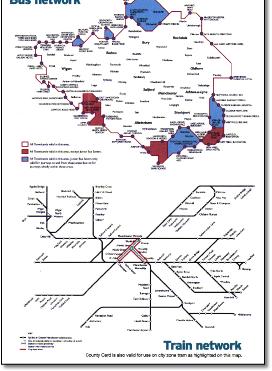 |
|
|
|
|
Uses a modified version of the map at the top of this page, showing the boundary of the network by greying out the lines instead of using a shaded box. Why is this system better for this map? Then corrects this by stating at the bottom 'Traincards also allow you to travel to and from Disley, New Mills Newtown and New Mills Central.
Lots of admonishments in black bordered boxes: 'Tickets are not valid on Metrolink services outside the City zone' (not actually clearly indicated) and 'Tickets are not valid on rail services outside the coloured zone'. Do coloured lines represent a zone and anyway this is the first mention of a zone - elsewhere it is always called the 'ticketing area'. Thought the leaflet was trying to promote an idea - not present a series of negatives.
|
|
|
 |
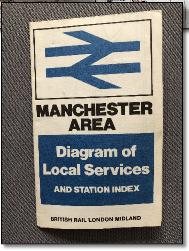 |
 |
|
|
|
|
|
|
|
 |
|
|
|
|
|
|
 |
 |
 |
 |
 |
 |
 |
 |
 |
 |
 |
 |
 |
 |
 |
 |
 |
 |
 |
 |
 |
 |
 |
 |
 |
 |
 |
 |
 |
 |
 |
 |
 |
 |
 |
 |
 |
 |
 |
 |
 |
 |
 |
 |
 |
 |
 |
 |
 |
 |
 |
 |



